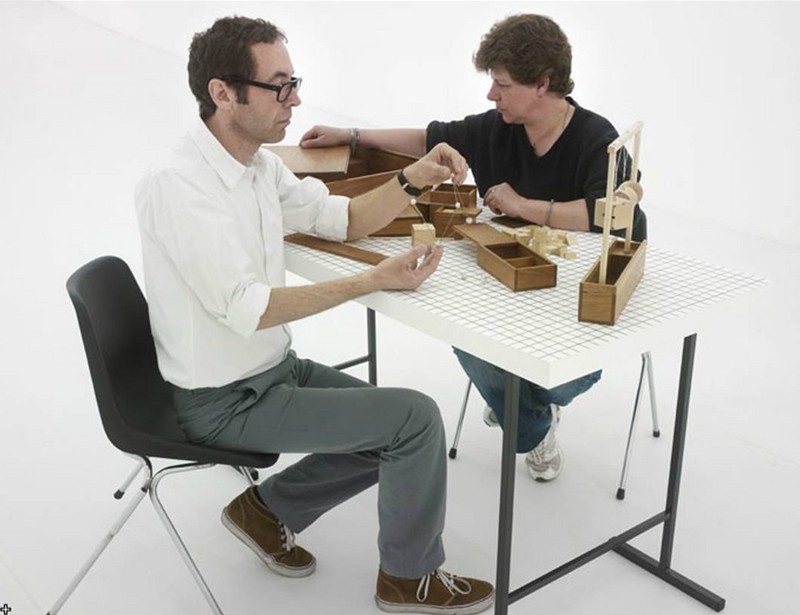Aurélien Froment
08 Apr - 12 Jun 2011

© Aurélien Froment
Formes de la nature, formes de la connaissance, formes de beaute, 2009-2011
Photo: Andre Morin, le Credac
Formes de la nature, formes de la connaissance, formes de beaute, 2009-2011
Photo: Andre Morin, le Credac
AURÉLIEN FROMENT
A show like any other
8 April - 12 June, 2011
The French artist Aurélien Froment has been developing his work in a range of media that runs from installation and photography to sculpture and video. This former projectionist who worked at a French movie theater focuses on the creative process in the cinema, the history of film and great film directors. For example, L’Adaptation manifeste (The Obvious Adaptation), a 2008 video by the artist, features a reading of film excerpts. In 2009 the artist likewise produced Cinemeccanica, an independent projection booth in homage to the filmmaker Werner Herzog.
In the Crédac exhibition space, Froment will set up two parallel situations that are designed to clarify each other.
In one of the two galleries, on a table that visitors can come together round, he will pose a box in which he will place the twenty “gifts” devised by Friedrich Fröbel, the German teacher and educationalist who founded the first kindergarten in 1837 and worked out one of the first systems of educational games. His “gifts” system is the basis for discovering elementary geometry as something that springs from the natural birth of forms.
The box features twenty educational games based on an analysis and synthesis of forms. Starting with the sphere (1st gift), which it analyzes in terms of surface, along with the cylinder and the cube, which it breaks down into several lesser cubes and blocks of different sizes, these are in turn broken down into surfaces, lines and points. The system works its way through to the 20th gift, modeling clay, which potentially contains all forms. Widely distributed, this system may have influenced the work of many 20th century artists and architects, including Mondrian, Braque, Kandinsky, Klee, Albers, Wright, Le Corbusier and Buckminster Füller.
Froment has proposed that the art center’s staff present the box to visitors who would like to discover the system. Once the presentation is completed, the box is closed again.
Integrated into the center’s educational program, certain activations will take place in the special kiosk located near Crédac that was built by the architect Renée Gailhoustet (who, along with Jean Renaudie, was responsible for the renovation of Ivry’s downtown beginning in 1970). This kiosk brings geometry immediately to mind and, rather naturally, the educational system that Fröbel devised.
Froment intends to use the second gallery as a screening room in the literal sense of the term—which makes it possible to rediscover the origins of the venue and bring out what Renaudie designed the architecture to be. Froment will be screening a new film that focuses on both the history of the chair and the act of sitting down.
A show like any other
8 April - 12 June, 2011
The French artist Aurélien Froment has been developing his work in a range of media that runs from installation and photography to sculpture and video. This former projectionist who worked at a French movie theater focuses on the creative process in the cinema, the history of film and great film directors. For example, L’Adaptation manifeste (The Obvious Adaptation), a 2008 video by the artist, features a reading of film excerpts. In 2009 the artist likewise produced Cinemeccanica, an independent projection booth in homage to the filmmaker Werner Herzog.
In the Crédac exhibition space, Froment will set up two parallel situations that are designed to clarify each other.
In one of the two galleries, on a table that visitors can come together round, he will pose a box in which he will place the twenty “gifts” devised by Friedrich Fröbel, the German teacher and educationalist who founded the first kindergarten in 1837 and worked out one of the first systems of educational games. His “gifts” system is the basis for discovering elementary geometry as something that springs from the natural birth of forms.
The box features twenty educational games based on an analysis and synthesis of forms. Starting with the sphere (1st gift), which it analyzes in terms of surface, along with the cylinder and the cube, which it breaks down into several lesser cubes and blocks of different sizes, these are in turn broken down into surfaces, lines and points. The system works its way through to the 20th gift, modeling clay, which potentially contains all forms. Widely distributed, this system may have influenced the work of many 20th century artists and architects, including Mondrian, Braque, Kandinsky, Klee, Albers, Wright, Le Corbusier and Buckminster Füller.
Froment has proposed that the art center’s staff present the box to visitors who would like to discover the system. Once the presentation is completed, the box is closed again.
Integrated into the center’s educational program, certain activations will take place in the special kiosk located near Crédac that was built by the architect Renée Gailhoustet (who, along with Jean Renaudie, was responsible for the renovation of Ivry’s downtown beginning in 1970). This kiosk brings geometry immediately to mind and, rather naturally, the educational system that Fröbel devised.
Froment intends to use the second gallery as a screening room in the literal sense of the term—which makes it possible to rediscover the origins of the venue and bring out what Renaudie designed the architecture to be. Froment will be screening a new film that focuses on both the history of the chair and the act of sitting down.
